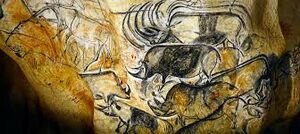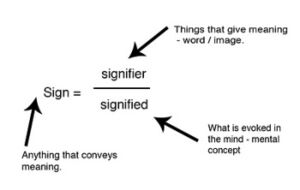User:MOsowski/GuidingPerspectives V1
__Core Concerns__
- Let us consider ideology as that which mediates between the interests of the individual and the interests of the social systems within which the individual lives. As such, ideology frames the actions of the individual to meanings and purposes within a larger realm. This larger realm may be purely on the level of a society, however it may also exist on the level of cosmology. In other words, the actions of the individual may be contextualized by invoking their role in a social system, however they may also be contextualized within a cosmic mythology, ie. as a responsibility within a mythic understanding of the universe.
In this way ideology allows us to "make sense" of our actions by relating them to a set of meanings beyond ourselves. In addition to this, ideology allows individuals in a collective to contextualize their actions within the same system of meanings. By existing throughout the collective, ideology solidifies itself and builds an inertia.
An interesting characteristic of ideology is the way in which it becomes naturalized into the psychology of individuals living in a society. Ideology is not necessarily dogmatic, it may exist through the embodiment and performance of (all) individuals in a group without any central actor preaching the ideology onto the populace. As such ideology functions through a sort of automatism, perpetuating itself through society by becoming internalized throughout its members, who internalize it precisely because of its prevalence. This process allows the automatism to continue. Although there may be a heirarchy which perpetuates and enforces an ideology, the specific indivuals within the heirarchy are not critical to the propagation of the ideology. Rather it is in the nature of the structure itself that ideology perpetuates, with the specific individuals inhabiting the heirarchy being replacable without much change to the overall ideological beliefs of the society.
This view of ideology begs the questions: is ideology inherent to human life, and is ideology escapable?
Today there is, at least on the surface, a prevailing belief that we have become emancipated from ideology. We no longer live within the religious fanaticisms of the past. We are no longer subject to totalitarian dogma. However, does this mean that we are free from ideology? In our seemingly "post-ideological" age, has our skepticism towards ideology led to the surfacing of a harder to define, yet equally potent, form of ideology? And if ideology no longer takes the form of a dogma professed from the top down, how does ideology exist in the distributed networks of symbols, meanings, and stimuli we are subject to today?
- I am quite interested in the psychological tensions which exist between the ability of us to place, for lack a better word, faith, into a symbolic landscape, and the realisation that the object of faith can not be attributed to anything more than a mental phenomenon. In other words, the tension that exists between placing faith in an ideal while simulataneously accepting its dissolution. This is a fundamentally existential concern and requires a commitment to, in the sense of Camus, the absurd.
If we assume that "post-ideology" has led to a new ideological state in which we are subject to a schizophrenia of consumption and associations; in which we are unable to imagine a way beyond the "non-ideological" forces of the economy, then is there potential in reappropriating narrative whilst accepting this above described tension to move beyond the present state? If so, what form may these narratives take, and how do we come to terms with the tensions here involved?
How do I build myself up, knowing that I rest on fundamentally unstable ground and may at any point be torn down?
Do I need to accept and embrace this instability to regain authentic meaning in a world where meaning is reduced to a commodity of the market and a tool of public relations?
Perhaps this relates to the distinction between poetics and aesthetics?
- Let us take as a starting point the notion that any period in history brings with it a set of technological means of creation, ie. media. These means of creation will bring with them their characteristics, limitations, aesthetics, etc. Any work made in these media must negotiate the attributes of the medium, and exists only in relation to this negotiation. This perspective sees the work therefore not as something free-standing, but rather as a configuration of the media used to create it. The work thus takes on a relational character; it is not the "thing in itself" but rather a stand-in formed through the negotiation of the medium. Take for instance the cave paintings of the Grotte Chauvet in France, painted approximately 30 000 years ago. It is quite clear that the paintings are not actually the scenes being depicted, but precisely a depiction of the scene formed through negotiating the stone and charcoal. The scene itself is not actually present. Over time as media and technology have changed, the forms taken by this "stand-in" have also changed.
This view has a close parallel to the notions of the signifier and signified in Saussure's structural linguistics. Here the signifier is that which represents the signified. The signified itself is not actually present when the signifier is used, the idea of it is merely invoked through the use of the signifier. If we consider a work to be, rather than the thing in itself, a representation of something else which is formed through the act of negotiating a medium, then we have a very similar relationship where the signified is not actually present, it is merely invoked through the signifier, ie. the work.
I think it is interesting to ask whether this negotiation of the medium and the relationship between signifier and signified still hold in the contemporary media landscape. If creative processes become increasingly automated and the digital tools we use to create lead to decreasing variation in the images we are presented, is the digital medium still negotiated, or is it automated? Likewise, if we are flooded with images to the point where it becomes impossible to focus our attention on any specific work, do images still take the role of a signifier, or have they become free-standing and self-referential? Do images, as they are presented to us, still represent something which is not itself present, or have we entered into a new relationship with these images, where they represent merely themselves?
What are the implications of representing something which isn't itself present?
- With my work I would like to walk a fine line between these concerns. If building narratives is a necessary act to move beyond the "post-ideological" condition, then what form may these narratives take? How does one construct symbolic landscapes while dealing with the knowledge that these landscapes are fundamentally subjective and fragile? What does it mean to represent something via signifier "at a distance"? What are the existential burdens and emancipations that follow from representation at a distance, and acknowledging that which cannot be represented?
__Satellite Concerns__
- In a time where aesthetics and messages can be easily reproduced and reappropriated, I am perhaps more interested in my relation to the work as opposed to the work itself. (Commodification).
- Postmodernity, capitalism, and schizophrenia.
- Business ontology (Mark Fisher).
- Mediation of experience (through information?)
__Relevant Books I've Read Recently__
- Envisioning Power: Ideologies of Dominance and Crisis - Eric Wolf
- Capitalist Realism - Mark Fisher
- The Power of the Powerless - Vaclav Havel
- Neuromancer - William Gibson
- The Birth of Tragedy - Friedrich Nietzsche


